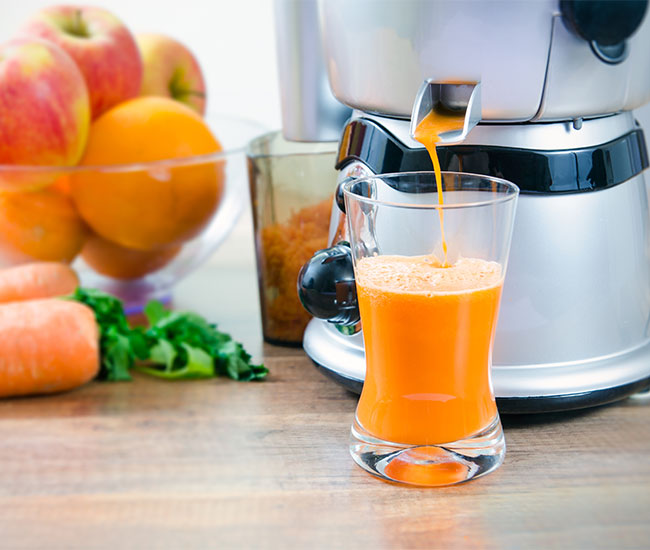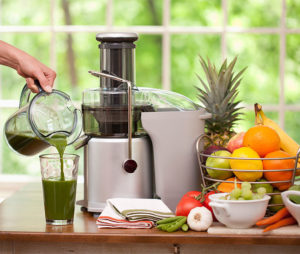

Juicers are an excellent way to prepare fresh fruit and vegetable juice at home. But which one to choose? It is normal to have doubts because there are a lot of them on the market. What features should the ideal juicer have? Which is the best juicer available? And what is the difference between a cold-press juicer and a centrifugal juicer?
You’ve decided you want to drink a freshly-made, all-natural juice every morning, and it’s the right way to go. But what should you choose, a cold-press juicer or a centrifugal juicer? There is a difference, even if the results are equally good. Centrifugal juicers extract the juice by chopping fruit and vegetables in a strainer with blades. They are faster than cold-press juicers, but also louder, and they produce more waste.
Cold-press juicers work more slowly, and they don’t overheat. They extract the juice with an auger, a sort of large screw that rotates and turns the vegetables into mush, squeezing out the juice and producing a smaller amount of dryer waste.
The number of circles per minute and the power of a juicer’s motor are important features that should be considered. A good juicer should have a motor with a speed of between 40 and 80 revolutions per minute. Within this range, they produce juices with excellent consistency, whereas more than 80 revolutions per minute can start to overheat the juice, with the risk of altering its nutritional properties.
In terms of the power, it is better not to go below 400W, because the juicer could get blocked or work too slowly.
SEE ALSO: Dishwasher: 5 myths debunked for cleaner dishes!
One of the weaknesses of juicers is that they need to be cleaned after every use. One of the parts that certainly needs washing is the filter, which can be made from plastic (cheaper) or stainless steel (more expensive but stronger).
Cleaning this machine involves a short process of taking it apart, washing it, and reassembling it, every time you prepare juice. This is why this procedure must be easy and quick. Read the opinions of other consumers, and the instructions from the producer. Choose a model that is easy to assemble, and whose parts can go in the dishwasher.
The central part of a cold-press juicer is called the auger, and it is a sort of large screw that rotates and squeezes the fibres of the vegetables inserted into the mouth of the juicer. The auger can be horizontal, vertical, or double, and the type of extraction depends on this structure. For example, a horizontal auger is more suitable for extracting juice from leafy vegetables or small fruits, such as berries. This type is currently used in most professional juicers, which are therefore more expensive.
A vertical auger is more common, and works better with medium to large fruit and vegetables; it is also more difficult to clean, but it takes up less space in the machine.
It may seem like a superfluous feature, but before choosing one of the many juicers on the market, ask yourself when you will be using it. If you normally prepare your juice very early in the morning, when the rest of your family is still asleep, the quietness of the motor is a factor to take into account! Usually, this is a feature that is well-advertised by the producer, because not all models have it.
We have to admit that there is a difference between cheap juicers and higher-end ones. The former often makes more mess: the seals can start to leak drops of juice over time, or the jug may not be very ergonomic. In any case, when you prepare fruit or vegetables for the juicer, use a plastic chopping board and a sharp knife, to help you cut the fruit without squashing it.
Clean the work surface immediately to avoid leaving stains and streaks. Many types of fruit and vegetables contain natural dyes (beetroot, cherries, berries) that may permanently stain surfaces. Use a spray detergent made with natural ingredients, such as Mister Magic Kitchen Surface Cleaner, which doesn’t need rinsing and leaves no unpleasant smells. Mister Magic Kitchen Surface Cleaner is specially created to clean kitchen counters, chopping boards, and other surfaces that come into direct contact with food.
SEE ALSO: How to clean stovetops: 5 tips for a sparkling hob with no streaks
